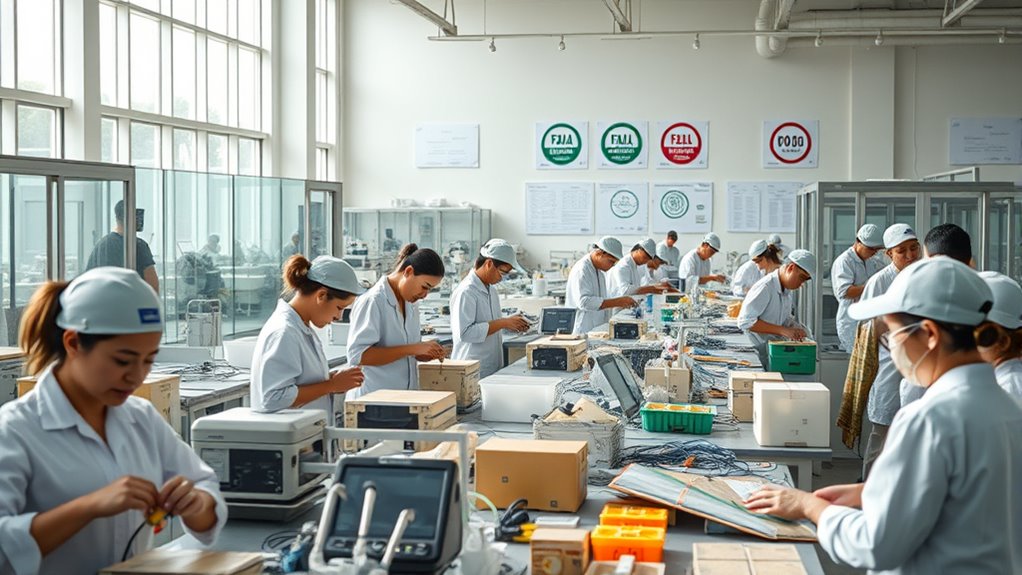Ethical supply chains guarantee products are made with fair labor practices and full transparency, allowing you to see how items are sourced from raw materials to finished goods. By supporting transparent brands, you help promote better wages, safe working conditions, and prevent exploitation. As consumer demand grows, companies are more likely to improve their sourcing standards. To discover how you can make more responsible choices, continue exploring ways to support ethical supply chains and fair labor practices.
Key Takeaways
- Supply chain transparency reveals product journeys, promoting ethical sourcing and accountability across multiple countries and workers.
- Transparency helps identify and prevent labor rights violations, ensuring fair wages, safe conditions, and reasonable hours.
- Consumer demand for ethical brands encourages companies to improve supplier practices and eliminate exploitative labor.
- Supporting transparent brands fosters responsible production, contributing to a more equitable and sustainable economy.
- Awareness of supply chain practices promotes responsible consumer choices and drives systemic change toward ethical supply chains.

Have you ever considered where the products you buy really come from? It’s easy to focus on the finished item—whether it’s a shirt, a phone, or a pair of shoes—and overlook the journey it took to reach you. Behind every product lies a complex supply chain, often stretching across multiple countries and involving numerous workers. That’s why understanding supply chain transparency is essential. When companies openly share details about their sourcing practices, you gain insight into whether they prioritize ethical production and fair treatment of workers. Transparency isn’t just about compliance; it’s about accountability. It allows consumers like you to see if labor rights are being respected at every stage, from raw material extraction to manufacturing and shipping.
When supply chain transparency is prioritized, companies are more likely to enforce strict standards that protect workers’ rights. Labor rights encompass fair wages, safe working conditions, reasonable hours, and the right to organize. Without transparency, these rights can be compromised, often hidden behind layers of contracts and regional regulations that may or may not be enforced. When a company openly discloses where and how its products are made, it creates a system of accountability. You can then make more informed choices, supporting brands that demonstrate a genuine commitment to ethical practices. Many organizations now publish detailed reports or have traceability tools that let you see the origin of their materials and the conditions under which workers operate. Additionally, understanding the importance of second trimester overview can help you appreciate the significance of every step in the supply chain process, from raw material extraction to final product delivery.
By demanding supply chain transparency, consumers push companies to improve their labor practices. When consumers show concern for labor rights, companies are compelled to scrutinize their suppliers more carefully and establish stricter standards. This pressure helps eradicate exploitative labor practices, such as forced labor, child labor, or unsafe conditions. It also encourages fair wages and respectful treatment for workers across the globe. As a conscious consumer, your purchasing decisions have the power to influence how companies operate. Supporting brands that are transparent about their supply chains and committed to fair labor rights helps foster a global shift toward ethical production standards.
Ultimately, understanding where your products come from goes beyond curiosity; it’s about making responsible choices. When you prioritize supply chain transparency and labor rights, you contribute to a more equitable and sustainable global economy. Your awareness can encourage companies to be honest about their practices, ensuring that the products you buy are not just well-made but also ethically produced. This ongoing demand for transparency and fair treatment helps build a future where ethical supply chains are the norm, not the exception.
Frequently Asked Questions
How Do Companies Verify Suppliers’ Labor Practices Effectively?
You verify suppliers’ labor practices effectively by conducting regular supplier audits and employing third-party verifications. These audits allow you to assess working conditions firsthand, while third-party organizations provide unbiased evaluations to guarantee compliance with labor standards. Combining these approaches helps you identify potential violations, enforce improvements, and maintain transparency in your supply chain. This proactive strategy ensures fair labor practices and strengthens your company’s commitment to ethical sourcing.
What Are the Biggest Challenges in Achieving Supply Chain Transparency?
You face significant challenges in achieving supply chain transparency, especially in ensuring supplier accountability. It’s difficult to verify that all suppliers follow ethical practices, even with efforts like ethical auditing. Limited access, complex global networks, and inconsistent reporting hinder transparency. To overcome these, you need robust auditing processes, clear standards, and ongoing communication to hold suppliers accountable and promote honest practices throughout the supply chain.
How Can Consumers Identify Ethically Sourced Products Easily?
Sure, because spotting ethically sourced products is as easy as deciphering ancient runes. Just look for certification labels like Fair Trade or Rainforest Alliance—those little badges are your shortcut to moral shopping. Boost your consumer awareness by doing quick research or trusting reputable brands. Remember, if it looks too good to be true, it probably is, so stay vigilant and let those labels be your guiding light in a sea of choices.
What Legal Frameworks Support Ethical Supply Chain Practices Globally?
You should know that legal frameworks like corporate social responsibility laws and ethical auditing standards support ethical supply chain practices globally. These laws encourage companies to be transparent and accountable for their labor practices. By adhering to these regulations, businesses demonstrate their commitment to fair labor and transparency. As a consumer, recognizing companies that comply with these frameworks shows they’re dedicated to ethical sourcing, helping you make informed, responsible choices.
How Does Technology Improve Monitoring of Fair Labor Standards?
Technology improves monitoring of fair labor standards through blockchain verification and AI audits. Blockchain ensures transparency by securely recording every transaction, making supply chain data tamper-proof and easily traceable. AI audits automatically analyze data for inconsistencies or violations, allowing you to identify issues quickly. These tools enable real-time monitoring, helping you uphold fair labor practices and maintain transparency throughout your supply chain efficiently and effectively.
Conclusion
By prioritizing ethical supply chains, you become the guiding star that lights the path toward fairness and transparency. Every decision you make is like planting seeds for a better future, where workers are treated with dignity and consumers can trust what they buy. Remember, an ethical supply chain isn’t just a chain—it’s a woven tapestry of integrity and respect. Together, you can transform the fabric of global trade into something stronger, brighter, and more just.









